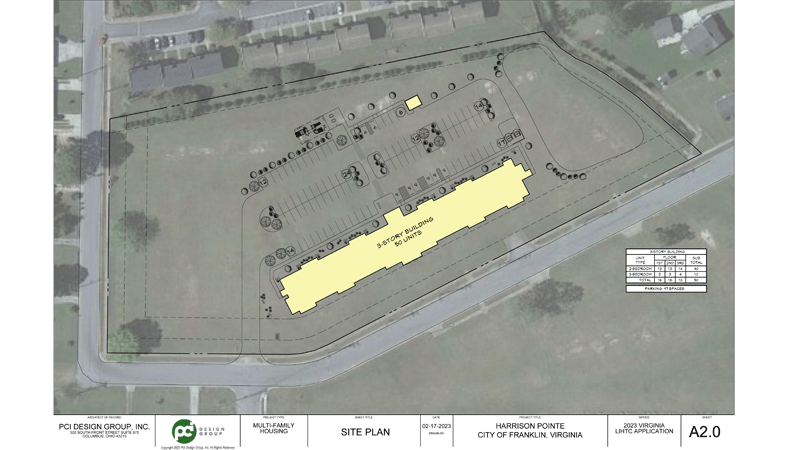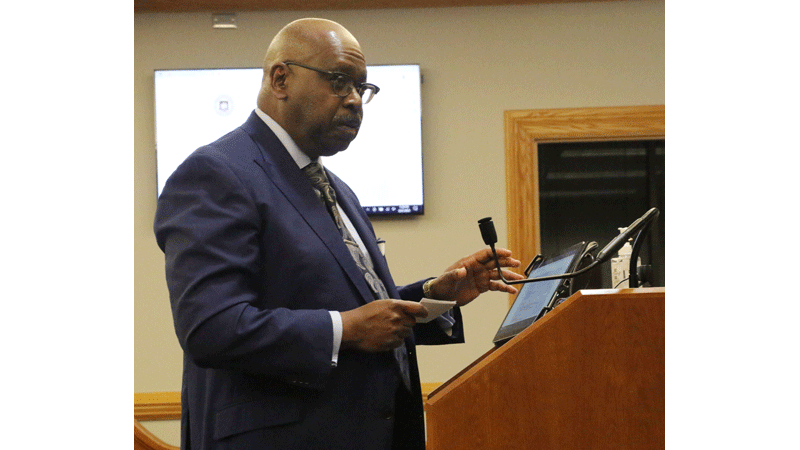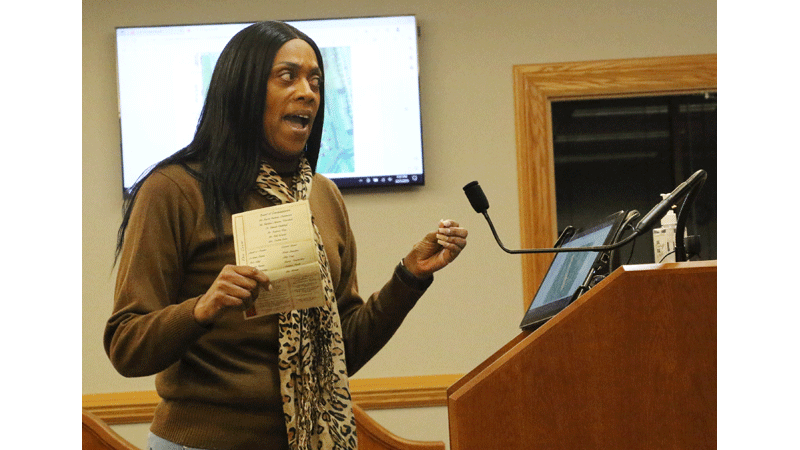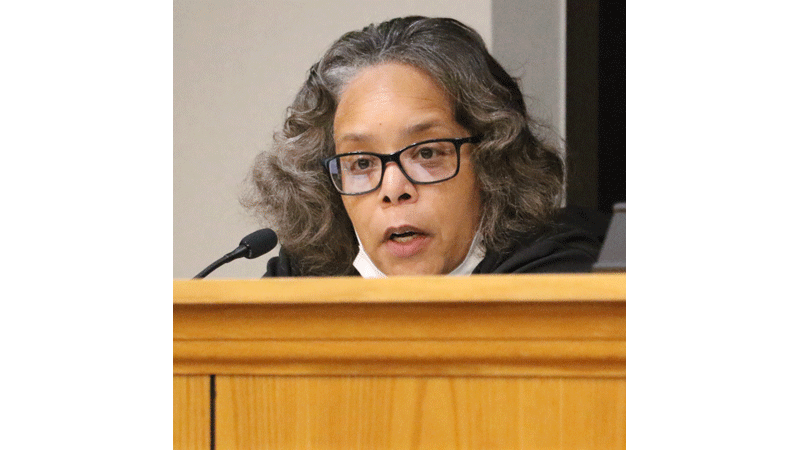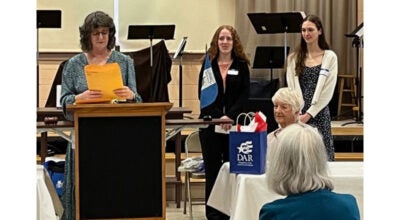Franklin City Council votes 5-1 against Banks Street rezoning
Published 7:25 pm Tuesday, March 21, 2023
|
Getting your Trinity Audio player ready...
|
Franklin City Council voted 5-1 on Feb. 27 to deny an application to rezone a vacant 9.78-acre lot located to the west of the intersection of Banks Street and Dorchester Street.
The purpose of the requested rezoning was to allow for the development of a multi-family dwelling as a principal permitted use, as noted in a staff report from Franklin Director of Community Development Carlee Gurskiy.
“The Franklin Redevelopment and Housing Authority and Woda Cooper Companies have partnered to propose the development of a 50-unit complex on a parcel approximately 10 acres large located on the corner of Bank Street and Dorchester Street,” Gurskiy said during the Feb. 27 council meeting.
In her staff report, she wrote that this property was formerly developed to have townhouses — Suburban Gardens — in the 1970s but has been vacant since the townhouses were torn down.
She also wrote that the applicant for the rezoning request is the owner, Franklin Redevelopment and Housing Authority, and the request includes an amendment of the zoning designation, R-2, General Residence, to R-1A Conditional, General Residence.
Ward 4 Councilman Dr. Linwood Johnson cast the lone vote in favor of the application, and Ward 3 Councilman Gregory McLemore abstained.
The council’s vote followed a public hearing in which 11 people spoke, including 10 who opposed both the rezoning and corresponding proposed apartment complex and one who supported them.
More than 45 people were on hand for the Feb. 27 meeting.
ABOUT THE PROPOSED APARTMENTS
Before the public hearing was opened, details relevant to the proposed apartment complex were shared by Gurskiy, Woda Cooper Companies Inc. Vice President of Development Bruce Watts and Gwendolyn Blue, of the FRHA.
Watts said the proposed apartment community, Harrison Pointe, was named after a former Franklin mayor, Dr. A.B. Harrison.
“This is a 50-unit development,” he said. “It’s 40 two-bedrooms with one-and-a-half baths. Three bedrooms have two baths to them.
“We have energy-efficient appliances, which basically means that the tenants here will save about 30% on their utility bills each month, and that is pretty significant when you do it over a period of a year or a period over several years,” he added.
Gurskiy said, “The building will have an elevator for accessibility to every floor, and for safety, there will be security cameras located around the property, and residents will be required to obtain a keycard for access into the building.”
Watts said there would be about 18 security cameras.
“As the management team, Woda intends to provide on-site management and maintenance staff,” Gurskiy said.
She noted, “Rent for these units will be based on income and a target for those who make between $20,000 and $60,000 per year. On average, tenants can expect to pay about $750 for a two-bedroom unit or $975 for a three-bed unit.
“The housing authority will also provide eight housing project-based vouchers,” she continued. “Tenants must be vetted and will go through a background check and standard screening process. They must also abide by management regulations to stay in the unit.
“The housing authority and Woda Cooper have a goal to submit a low-income tax grant application through (Department of Housing and Urban Development) by March 16,” she added. “Tonight is the only opportunity for the property to be rezoned prior to their deadline this year.”
Watts said the complex would include a 749-square-foot community room, a library and a fitness center.
He said the project would cost about $14.5 million.
“And also because of the value of it, and we looked at all sorts of statistics, it will not devalue any property in that area, because quality affordable housing does not decrease property values,” he said. “You can look at any research in this country — it does not do it.”
He noted that Woda Cooper has more than 350 apartment units in the U.S., and he highlighted the company’s track record.
“Our occupancy rate is 96%,” he said. “Our residents don’t leave our facilities, mainly because of the quality of them, the maintenance of them, the property manager, and it feels like a home to them,” he said. “It’s only 50 apartments. We’re not doing 100, 150, 200 apartments, so everyone basically knows each other in that apartment complex, which is extremely important — to know your neighbor.”
He also noted that the proposed apartments were consistent with Franklin’s 2015 Comprehensive Plan.
PLANNING COMMISSION’S RECOMMENDATION
In her staff report, Gurskiy stated that the Franklin Planning Commission held a public hearing on Feb. 23, and commissioners voted unanimously to not recommend the approval of the conditional rezoning from R-2 to R-1A at the Banks Street property.
FEB. 27 PUBLIC HEARING
Dorothy Boone said she was excited when she thought the area in question was going to have single-family homes built.
“I was thinking this was something new and great for the community,” she said. “Please don’t allow this property to be rezoned as projects. Please take in consideration of our community, our seniors and city at large. My parents always told me everything that sounds good and looks good ain’t good.”
Mona Murphy said, “I stand here tonight again to say to you, ‘Listen to the citizens.’ We have to listen to the citizens. I have been in Franklin all my life. We have seen apartments, we have seen projects, not just Berkley Court, Suburban Gardens, but even in our area. We don’t need it anymore.”
She asked the council to follow the Planning Commission’s recommendation.
“We’ve all been here before, and I ask you, if it was in your area, would you want it?” she said.
Carolyn Williams, who resides on Dorchester Street said, “I’ve been residing there since 1977, and I believe in supporting my community, and my community is really concerned about what’s trying to take place. So please consider not to accept that, because we have to live there, and we have a lot that’s going on in our area already. Dorchester has been known for crime rate, and why bring another group of apartments in with the same stuff? We are trying to clean up our city, not bring it down.”
Lokette Wiggins Myrick, who also lives in Ward 5, said the developers want to refer to the apartments as “units.”
“Like I’ve said before, I give you six months — they’re going to be projects,” she said.
She said Dorchester is already dealing with people coming into the community from other cities and states, playing loud music and shooting guns at night.
She expressed her desire, as did other speakers, to be a homeowner one day.
“I didn’t go to school and get those five degrees for someone to tell me I’m going to always be in poverty,” she said. “Some of us want to own houses. Some of us don’t want to stay in apartments and projects. We want something better. I want to be able to have my grandkids come out and play in the yards and not have to worry about ducking down or the men hiding behind bushes ready to come in your house and take what you worked for.
“So I would ask y’all to please reconsider, because see, half of y’all that’s voting for this stuff don’t even live in that area,” she continued. “So think about that when you’re laying in your bed at night.”
She recalled having to jump off her bed and hit the floor when she has heard shooting in her neighborhood.
“I’ve lost the weight now so I can jump on the floor, but I’m tired of jumping on the floor,” she said. “I want to be able to lay down and sleep good.”
COUNCIL MEMBER COMMENTS
Ward 5 Councilwoman and Vice Mayor Wynndolyn H. Copeland said, “I would like everyone to know that I conducted a survey, and a majority of the citizens said ‘no’ to the rezoning and ‘no’ to a multi-family complex. One individual said ‘yes’ but later recanted and said, ‘No. If I lived where you lived, then I would say no.’
“There are currently seven apartment complexes already in Ward 5 — seven,” she continued. “Ward 5 citizens are dealing with gun violence, loud music, litter and vandalism. The Planning Commission unanimously voted ‘no’ to the rezoning of Banks Street, and I’m requesting that this council agrees with the Planning Commission’s recommendation.”
Johnson spoke from his experience as a Franklin citizen and as a member of the Virginia Municipal League, which helps to run 35 cities composed of populations of 10,000 or less in Virginia.
“I marched on City Council years ago with the fight against high utilities,” he said. “They went down some, but we still have high utilities. The city of Franklin is critical at this point. We have problems in the city.”
He later said, “Let us consider this topic, let it resonate in your mind now — affordable housing versus raising taxes.”
He repeated those last five words twice more.
“Affordable housing brings income in the city, keeping taxes low,” he said.
He went into detail about how the proposed apartment complex could help bring needed revenue to the city.
“Guess what, if we fall in dire need financially, then the state will come and run the city of Franklin,” he said.
Franklin Mayor Robert “Bobby” Cutchins interjected, “I don’t think we’re at that point, Mr. Johnson.”
“I didn’t say we were, Mayor, but if we don’t prepare, we will get there,” Johnson said, asking to be able to finish his comments without interruption.
“I am heading up this meeting,” Cutchins said. “I’m asking you not to put fear that the city is in trouble. I don’t like that because we’re not failing. So, please, that’s all I ask. Thank you.”
Johnson said, “I have not put fear in anyone.”
Copeland said, “Yes you have.”
Johnson was able to conclude his comments, pressing home the city’s need for the income that affordable housing could provide.
McLemore also highlighted the city’s need for revenue sources that will help keep taxes lower, but he opted to abstain from voting because he was not sure how the public events he is planning in the city could be adversely affected by the matter at hand.


